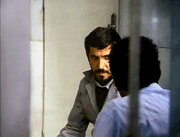 The Kiarostami documentary Close-Up is worth seeing just for the scene where some guys in a car stop to ask directions from a man holding two giant dead turkeys, feathers and all. He gives them directions and before they drive off he holds the birds up to the window and says “You need a turkey?”
The Kiarostami documentary Close-Up is worth seeing just for the scene where some guys in a car stop to ask directions from a man holding two giant dead turkeys, feathers and all. He gives them directions and before they drive off he holds the birds up to the window and says “You need a turkey?”
These bizarre and mundane moments are typical (and so endearing) of Kiarostami–all of his films are have numerous scenes of people driving in cars. More action takes place driving to destinations than ever happens at the actual destinations. In fact, the camera usually stays behind in the car even after the passengers reach their destination. This happens in Close-Up, in the opening scene when a reporter and some policemen are being driven to a house to arrest a man who has been impersonating the Iranian filmmaker Mohsen Makhmalbaf. They finally find the house (with the help of the turkey-man) and the reporter goes in alone, leaving the driver with the policemen, who make small talk about their families. Then they are re-joined by the reporter, and the police take the man away, and we stay behind with the reporter as he goes house to house looking for a tape recorder. We don’t even get to see the spectacle of the “event” taking place. This scenario happens in several Kiarostami films. It is a very non-Western approach to storytelling, and one might say that Kiarostami is much more interested in “the journey” than the destination, but even that seems like too Western an idea. The journeys he documents are not necessarily life-changing or even dramatic ones. He just seems to think that the important stuff is in these small moments, connections between people, even fleeting or mundane ones, even in the face of larger, more “important” events.
And this goes for more than just driving scenes. In The Wind Will Carry Us, what I remember more than anything is the endless string of scenes of the main character trying to get cell phone service. He climbs up a hill, and back down, and up again, over and over, getting and then losing reception repeatedly. He tries this for days, never really completing his important call. I still remember the sound of the rocks and gravel crunching under his feet as he climbs up and down, up and down. So much screen time is spent on this, an activity that would definitely have been cut out of any Hollywood movie, that it is more memorable to me than any spectacular action sequence in any big-budget film.
It takes some getting used to, but it’s a wonderful way to make movies. And despite the focus on nothingness, Kiarostami’s films are among the most cathartic I’ve ever seen. They all seem to involve characters enduring great emotional and existential suffering, a suffering that is ultimately unburdened in one way or another. In Close-Up, the Makhmalbaf impersonator (Sabzian) confesses his crimes and explains why he ingratiated himself into a family by pretending to be the filmmaker–his own broken family and poverty and failures in life, the acceptance and love and respect they gave him when they thought he was the filmmaker, which he had never experienced before–and Kiarostami’s compassionate questioning of the man comes across as possibly the most caring he has ever experienced in his life. Likewise, at the film’s end (SPOILER AHEAD), when Makhmalbaf himself meets him to pick him up from jail, it is a great catharsis when Sabzian stops in his tracks and bows his head and begins to cry when he sees his hero. “Don’t cry,” Makhmalbaf says, and hugs and kisses him. “Who are you today? You want be me? I’m tired of being me.” He then drives him home–on a motorbike, no less, so he gets to hug his hero for the whole ride. It is an ending that provides great compassion and relief, both for Sabzian and for the audience.
 Filed by cynthia rockwell at 12:14 pm under Just Movies
Filed by cynthia rockwell at 12:14 pm under Just Movies 3 Comments
3 Comments So I put it down and watched
So I put it down and watched 
 The Kiarostami documentary
The Kiarostami documentary 
 This weather is HORRIBLE. I guess Mother Nature is skipping summer this year, and withholding sunlight for some reason to punish us. I have always liked overcast weather but this is too much.
This weather is HORRIBLE. I guess Mother Nature is skipping summer this year, and withholding sunlight for some reason to punish us. I have always liked overcast weather but this is too much.